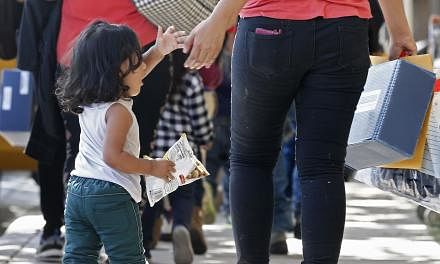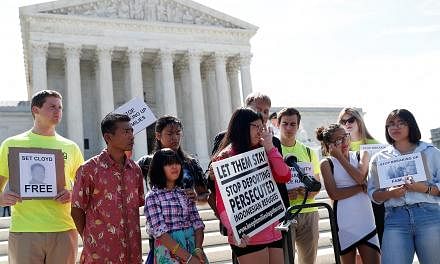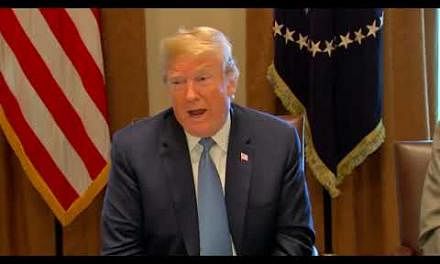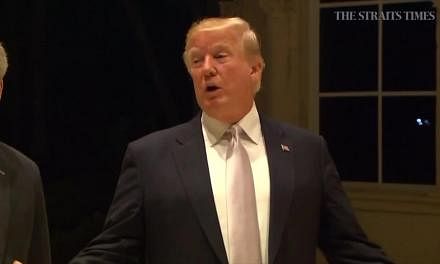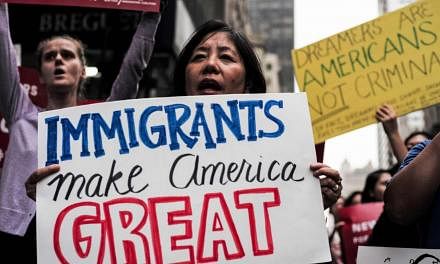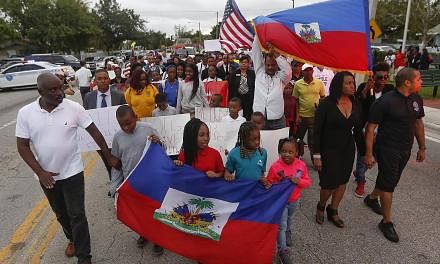WASHINGTON (REUTERS, AFP) - The US Supreme Court on Tuesday (June 26) handed Mr Donald Trump one of the biggest victories of his presidency, upholding his travel ban targeting several Muslim-majority countries.
The 5-4 ruling, with the court's five conservatives in the majority, ends a fierce fight in the courts over whether the policy represented an unlawful Muslim ban.
Mr Trump can now claim vindication after lower courts had blocked his travel ban announced in September 2017, as well as two prior versions, in legal challenges brought by the state of Hawaii and others.
Trump pounced on the decision as an endorsement of his authority to defend national security and "a tremendous success and victory for the American people."
"Wow!" the president tweeted on Tuesday, minutes after the court's decision. He said the court's ruling was "pretty much the final word."
The president defended his hard-line immigration and travel policies, saying: "We have to be tough, and we have to be safe, and we have to be secure. At a minimum, we have to make sure that we vet people coming into the country."
Protesters took to the streets from Washington to Los Angeles and New York to bemoan the decision, and oppose the administration's hardline approach on the southern border, where 2,000 children remain separated from their migrant parents.
The court held that the challengers had failed to show that the ban violates either US immigration law or the US Constitution's First Amendment prohibition on the government favouring one religion over another.
Writing for the court, Chief Justice John Roberts said that the government "has set forth a sufficient national security justification" to prevail.
"We express no view on the soundness of the policy," Mr Roberts added.
The ruling affirmed broad presidential discretion over who is allowed to enter the US. It means that the current ban can remain in effect and that Mr Trump could potentially add more countries.

He has said the policy is needed to protect the country against attacks by Islamist militants.
The current ban announced in September prohibits entry into the US of most people from Iran, Libya, Somalia, Syria and Yemen.
The Supreme Court had allowed it to go largely into effect last December while the legal challenge continued.
Mr Roberts said the actions taken by Mr Trump to suspend entry of certain classes of people were "well within executive authority and could have been taken by any other president - the only question is evaluating the actions of this particular president in promulgating an otherwise valid proclamation".
The challengers have argued the policy was motivated by Mr Trump's enmity toward Muslims and urged courts to take into account his inflammatory comments during the 2016 presidential campaign. Mr Trump as a candidate had called for "a total and complete shutdown of Muslims entering the United States".
In dissent, liberal Justice Sonia Sotomayor said there were "stark parallels" with the court's now discredited 1944 decision that upheld US internment of Japanese-Americans during World War Two. Mrs Sotomayor described at length various statements Mr Trump made on the campaign trail.
"Taking all the evidence together, a reasonable observer would conclude that the proclamation was driven primarily by anti-Muslim animus," she added.
The travel ban was one of Mr Trump's signature hardline immigration policies that have been a central part of his presidency and "America First" approach. He issued his first version just a week after taking office, though it was quickly halted by the courts.
Chad initially was on the list of countries targeted by Mr Trump that was announced in September, but he removed it on April 10. Iraq and Sudan were on earlier versions of the ban. Venezuela and North Korea also were targeted in the current policy. Those restrictions were not challenged in court.
Mr Trump also has moved to rescind protections for young immigrants sometimes called Dreamers brought into the United States illegally as children, intensified deportation efforts and pursued limits on legal immigration.
But last week he retreated on his administration's practice of separating the children of immigrants from their parents when families were detained for illegally entering the US.

